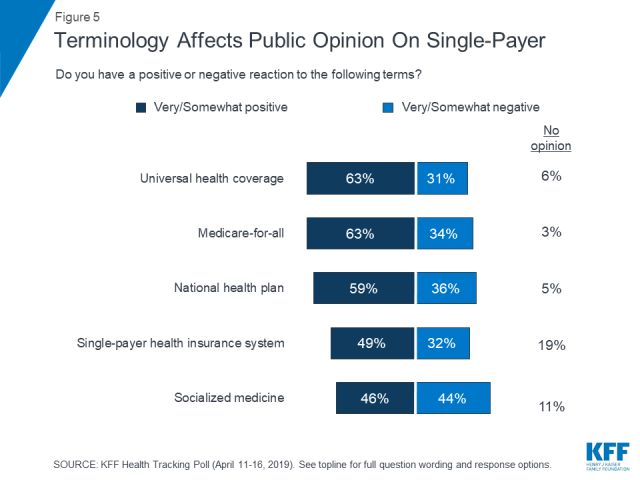By: Staff – kff.org – April 24, 2019
For many years, Kaiser Family Foundation has been tracking public opinion on the idea of a national health plan. Our polls have shown a modest increase in support for the idea of a national health plan (Figure 1) but relatively stable support for the federal government doing more to help provide health insurance for more Americans since before the passing of the 2010 Affordable Care (Figure 2). Recently, we have found broad support for proposals that expand the role of public programs like Medicare and Medicaid (Figure 3). Overall, about six in ten adults favor a national health plan or Medicare-for-all plan (Figure 4). Yet, how politicians discuss these different proposals does affect public support (Figure 5 and Figure 6). In addition, when asked why they support or oppose a national health plan, the public echoes the dominant messages in the current political climate (Figure 7). A common theme among supporters, regardless of how we ask the question, is the desire for universal coverage (Figure 8).
There is robust support among Democrats, and even support among Republicans, for an expansion of the Medicare program through a Medicare buy-in or a Medicaid buy-in proposal (Figure 9). In addition, nearly half of Republicans and majorities of independents and Democrats favor an optional Medicare-for-all plan (Figure 10). Yet, it is unclear how much staying power this support has once people become aware of the details of any plan or hear arguments on either side. Public support for Medicare-for-all shifts significantly when people hear arguments about potential tax increases or delays in medical tests and treatment (Figure 11) and recent polling also shows many people falsely assume they would be able to keep their current health insurance under a single-payer plan (Figure 12), suggesting another potential area for decreased support.
During the 2018 midterm elections, few voters said a candidate’s position on a national health plan was the single most important factor in their vote (Figure 13) and in the latest Tracking Poll more Democrats and Democratic-leaning independents want lawmakers to focus on improving and protecting the ACA than on passing a national Medicare-for-all plan (Figure 14). So while the general idea of a national health plan (whether accomplished through an expansion of Medicare or some other way) may enjoy fairly broad support in the abstract, it remains unclear how the future of this issue – which really gained traction during the 2016 presidential primary and Bernie Sanders’ rallying cry for “Medicare-for-all” – will play out.
To see this article and link to the PDF’s and graphs, click read more.
 Listen Online
Listen Online Watch Online
Watch Online Find a Station in Your Area
Find a Station in Your Area







 Listen Now
Listen Now Watch Online
Watch Online
